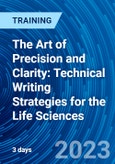Technical writing is defined as simplifying the complex. Implied in this deceptively simple definition is an entire range of skills and characteristics that touch upon a broad range of human performance characteristics and needs.
What do technical writers in the life sciences write? They write standard operating procedures, work instructions, job aids, batch records, reports, journal papers, manuals, user directions, label information, etc. It is not the role of technical writing to entertain or to showcase the educational level and importance of the writer. In the technical writing realm, writing simply for anyone to understand is the demonstration of excellence and superior writing skill.
An effective technical writer must consider many aspects of the craft to be truly effective. Writers, must adopt and apply the form and style of the industry in which they work as there are differences, for example, between the documents written for a pharmaceutical production operation versus the creation of scientific journal articles. Writers must understand their audience in terms of their needs and abilities and the level of explanation that they require as well as their command of the language in which the material is written. They must have a complete and unwavering dedication to accuracy and consistency. Technical writers must understand and be skilled at collaboration as that is how accuracy is achieved - by harvesting information from subject matter experts.
Why Should You Attend
Even with the advent of technology, we still communicate with the written word. Technical writing is about conveying information quickly, accurately, clearly, and succinctly. How we communicate, how we are understood, and how the message is received directly depends upon our skills as technical writers. In the life sciences, this skill is exceedingly important.
In the life sciences, the stakes are high in terms of the writing’s ability to enable 100% accurate understanding of the content and where applicable, performance of the task or procedure documented. In the life sciences, that could mean the difference between life or death, safety or injury, loss or recovery, contamination or purity, success or failure.
Unfortunately, technical writing is not a skill that is given much emphasis in college curriculums if any. Technical writing is a skill life sciences workers are assumed to have and are expected to demonstrate at a level of skill usually beyond the capability of most. Unfortunately, most readers of technical writing are in the “same boat.” They “don’t know a good one when they see one.” At the end of the day, in most cases, you have mediocre writing at best that may or may not convey the message intended.
Each critical aspect of writing technical documents for the life sciences will be addressed with the goal of helping you become a better technical writer. The tips and skills presented can be applied immediately and will be evident in the very first document that you write after this virtual seminar.
Learning Objectives
At the completion of this seminar, you will be able to:
- Execute the technical writing process to effectively create your document.
- Explain the results and impact of poor technical writing.
- Execute an effective writing process.
- Apply the principles of effective technical writing.
12.0 RAC CREDITS
RAPS - This course has been pre-approved by RAPS as eligible for up to 12 credits towards a participant's RAC recertification upon full completion.
Course Content
Course Provider

Charles H. Paul,
President ,
C. H. Paul Consulting, Inc.Charles H. Paul is the President of C. H. Paul Consulting, Inc. – a regulatory, manufacturing, training, and technical documentation consulting firm – celebrating its twentieth year in business in 2017. He has been a regulatory and management consultant and an Instructional Technologist for 30 years and has published numerous white papers on various regulatory and training subjects. The firm works with both domestic and international clients designing solutions for complex training and documentation issues.
He has held senior positions in consulting and in corporate training development prior to forming C. H. Paul Consulting, Inc.. He also worked for several years in government contracting managing the development of significant Army-wide training development contracts impacting virtually all of the active Army and changing the training paradigm throughout the military.
He has dedicated his entire professional career explaining the benefits of performance-based training
Who Should Attend
Anyone in the life sciences that is tasked with writing technical material to include standard operating procedures and work instructions.
Job Functions - engineering, research & development, compliance and regulatory, operations, analytical, logistics/supply chain, training & development and technical services.
Job Titles - associates, supervisors, managers, associate directors, directors









